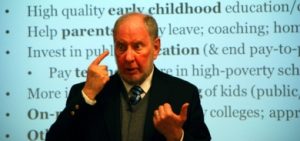Robert Putnam talks about OUR KIDS: The American Dream in Crisis Robert Putnam discusses how socioeconomic mobility is becoming increasingly difficult, threatening low-income populations.

By Stan Paul
“We were poor and didn’t know it.” This is the consensus of America’s “class of 1959” says Robert Putnam, Harvard scholar and prolific author of such well-known titles as Bowling Alone: The Collapse and Revival of American Community; Making Democracy Work; Better Together: Restoring the American Community; and, co-author of American Grace.
Putnam spoke April 21 at the Luskin School of Public Affairs about his latest book, OUR KIDS: The American Dream in Crisis, which begins with a semi-nostalgic look back at the small American town where he grew up – Port Clinton, Ohio.
But, Putnam’s look back is less a wistful recollection than a sobering contrast to the “upward mobility” that, he argues, was more available to more people than now. And, Port Clinton is representative of every town across America where now the so-called American Dream appears to be slipping away from a greater number of lower-income people, specifically young students.
During his noontime talk — sponsored by the Luskin School’s Center for Civil Society and Center for the Study of Inequality — Putnam offered numerous examples of the benefits of “who your parents happen to be” today. Fundamentally, “that’s wrong,” he said, citing that even the ability to afford and the opportunity to participate in extra-curricular activities, and develop marketable “soft skills” today is predictive of a higher paid job in the future.
To the class consensus he adds in his book, “In fact, however, in the breadth and depth of the community support we enjoyed, we were rich, but we didn’t know it.”
Robert Putnam is the Malkin Professor of Public Policy at Harvard and former dean of the Kennedy School of Government at Harvard.

Leave a Reply
Want to join the discussion?Feel free to contribute!